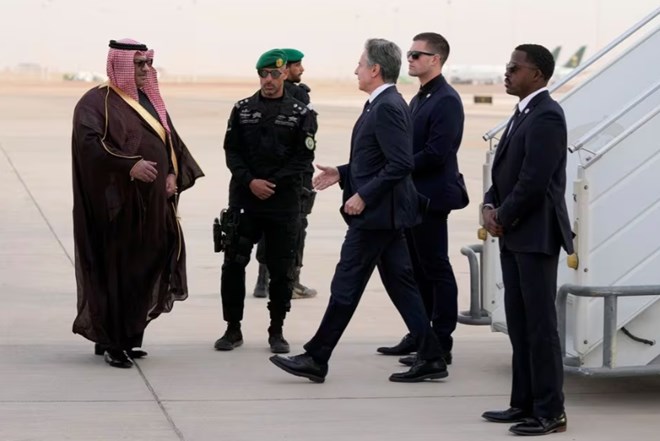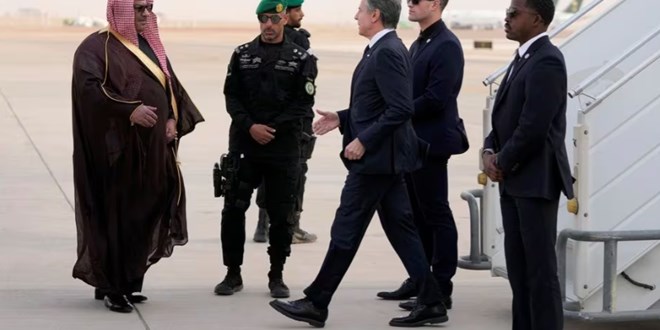[ad_1]

By Humeyra Pamuk
Tuesday February 6, 2024
 U.S. Secretary of State Antony Blinken is welcomed upon arriving at King Khalid International Airport, in Riyadh, Saudi Arabia, Monday, Feb. 5, 2024. Mark Schiefelbein/Pool via REUTERS Acquire Licensing Rights
U.S. Secretary of State Antony Blinken is welcomed upon arriving at King Khalid International Airport, in Riyadh, Saudi Arabia, Monday, Feb. 5, 2024. Mark Schiefelbein/Pool via REUTERS Acquire Licensing Rights
U.S. Secretary of State Antony Blinken met Saudi Arabia’s de-facto ruler, Crown Prince Mohammed bin Salman on Monday at the start of a Middle East tour, a U.S. official said, as Washington sought to forge a Saudi normalization deal with Israel.
In the Gaza Strip, Palestinians huddling under bombardment said they hoped Blinken’s visit to the region would finally deliver a truce, in time to head off a threatened new Israeli assault on the last refuge at the enclave’s edge.
Blinken’s meeting with the Saudi leader lasted about two hours. Blinken did not respond to shouted questions from reporters on how it went as he returned to his hotel, but waved as he walked by.
Blinken is also set to visit Egypt, Qatar, Israel and the Israeli-occupied West Bank this week and push to advance the Egyptian- and Qatari-mediated conversations with Palestinian Hamas militants on a deal to free Israeli hostages held in Gaza.
His Middle East trip, his fifth since a deadly Oct. 7 attack on Israel by Hamas militants from Gaza, takes place during a period that senior U.S. officials describe as one of the most dangerous for the region in decades.
The conflict has escalated as Iranian-backed groups have entered the fray and fired on U.S. forces in Iraq and Syria, while Yemen’s Houthis attacked shipping routes in the Red Sea.
The U.S. has been carrying out retaliatory strikes on Iran-backed militias across Syria, Iraq and Yemen in response to a drone strike last week in Jordan that killed three American troops and wounded dozens.
Blinken will nevertheless try to reinforce the message that the Biden administration neither seeks war with Iran nor wants the conflict to spread further despite calls by some opposition Republicans in Congress advocating for attacks inside Iran.
The Pentagon also said it does not believe Tehran wants war either. Iran has so far avoided any direct role in the conflict, even as it backs those militia groups.
A key priority is for Blinken to “deliver a message directly to countries in the region that the United States does not want to see the conflict escalated and will not escalate the conflict,” a senior U.S. official told reporters en route to Riyadh.
“It’s important to show up and say it on one-on-one.”
White House national security adviser Jake Sullivan on Sunday refused to be drawn on whether the United States might attack sites inside Iran. He said Washington did not see a wider war, but would continue to respond if attacked.
There is no reason for the U.S. campaign of retaliation, unfolding since Friday, to derail Washington’s conversations with Arab states and Israel on normalization and post-war Gaza, the senior U.S. official said.
PIECES INTERLOCKED
More than 130 hostages are still being held in Gaza, and their possible release by Hamas is among issues under discussion in the conversations that are mediated by Qatar and Egypt with the backing of the United States, in return for a humanitarian pause. While officials have noted some progress, they cautioned that gaps remain.
“It’s not a coincidence that we are going to the three countries that are involved in those talks: Egypt, Qatar, and Israel,” the U.S. official said but managed the expectations: “Impossible to say if we’ll get a breakthrough, when we’ll get a breakthrough.”
The hostage deal and the humanitarian pause are now seen as instrumental in helping advance conversations on a normalization deal between Saudi Arabia and Israel, which had been frozen in the immediate aftermath of Oct. 7 but resumed in recent weeks.
Speaking in Davos last month, Blinken said there was “a new equation” in the Middle East in which Israel’s Arab and Muslim neighbors were prepared to integrate Israel into the region but they needed to see a pathway to creation of a Palestinian state.
Conversations on who would govern Gaza after the war, how the Palestinian Authority needs to be reformed to potentially rule the enclave and obtaining security guarantees for Israel are now moving parts of the same equation, the U.S. official said, adding that achieving results would require compromises from Israelis and Palestinians.
“If we get a humanitarian pause, we want to be in a position to move as quickly as possible on the various pieces of day after – reconstruction of Gaza, PA (Palestinian Authority) reform, governance of Gaza, two states, normalization. Some of which are obviously quite difficult and quite complex,” the official said.
Israeli Prime Minister Benjamin Netanyahu has been at odds with the Biden administration over the creation of an independent Palestinian state, saying he would not compromise on “full Israeli security control of all territory west of the Jordan River.”
The talks are at a sensitive phase and any progress won’t come easy, the U.S. official added.
Reporting by Humeyra Pamuk; additional reporting by David Brunnstrom; Editing by Doina Chiacu, Chizu Nomiyama and Howard Goller
[ad_2]
